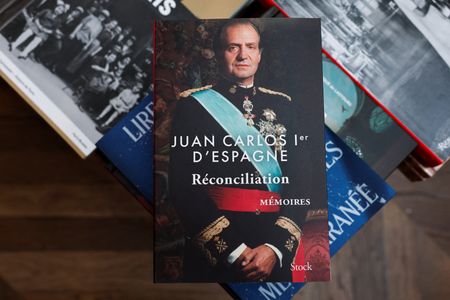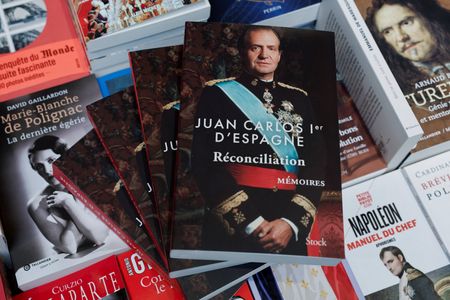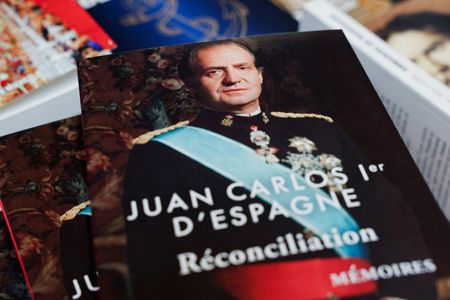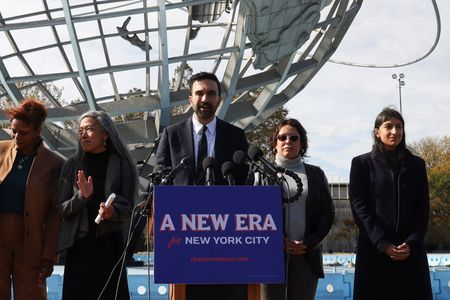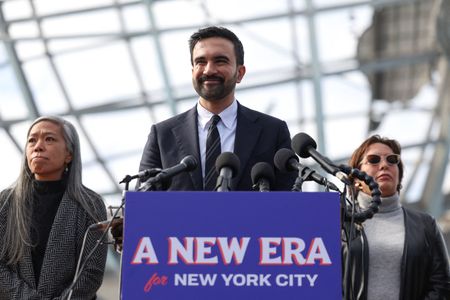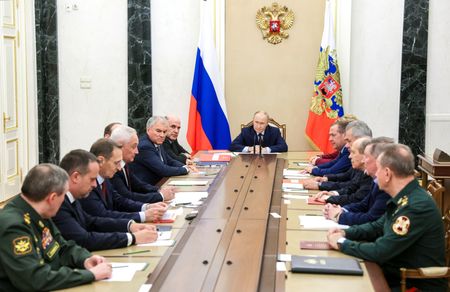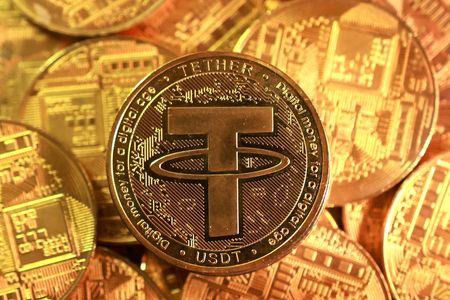By Lewis Macdonald and Aislinn Laing
PARIS/MADRID (Reuters) -Spain’s disgraced former king, Juan Carlos, feels abandoned and misunderstood, including by his son and heir, King Felipe VI, and by other close family members, according to his memoir that went on sale in France on Wednesday.
In “Reconciliation”, Juan Carlos, 87, said he understood why Felipe needed to be “firm as king” in public, keeping his father at a distance, but said it was painful that “as a son he should be insensitive”.
Juan Carlos, who played a key role in Spain’s transition to democracy after the death of dictator Francisco Franco, said he bitterly regretted an affair with Danish-German socialite Corinna zu Sayn-Wittgenstein-Sayn, saying it had harmed his reputation among his compatriots and led to his downfall and self-imposed exile in Abu Dhabi.
“I gave freedom to the Spanish people by establishing democracy but I was never able to enjoy that freedom for myself,” he wrote.
“Now that my son has turned his back on me out of duty, now that those who call themselves my friends have turned their backs on me, I realise that I have never been free.”
Juan Carlos said he wanted to return to Spain, enjoy a quiet retirement and a harmonious relationship with Felipe, and be buried with state honours.
The 512-page memoir, written in collaboration with French journalist and author Laurence Debray, is an attempt to reclaim his legacy after decades of scandal, Juan Carlos said.
“My father always advised me not to write my memoirs,” he wrote. “(Kings’) secrets remain buried in the shadows of their palaces. Why am I disobeying him today? I feel as though my story is being stolen from me.”
EX-KING SAYS HE GREATLY RESPECTED FRANCO
Born in exile in Italy in 1938 during the Spanish Civil War, he was separated from his parents at the age of 10 after being summoned to Spain by Franco, who groomed him to be his successor.
Juan Carlos said he grew to admire Franco, who ruled Spain for 36 years.
“I respected him enormously, appreciated his intelligence and political sense,” wrote Juan Carlos, who was crowned king two days after Franco’s death in 1975.
He also wrote about the death in 1956 of his 14-year-old brother Alfonso in Portugal as the pair cleaned a pistol – the first time he said he had spoken of the traumatic episode.
“I lost a friend, a confidant. He left a huge void,” Juan Carlos wrote. “Without his death, my life would have been less bleak, less unhappy.”
As king, Juan Carlos quickly implemented reforms that led to democratic elections in 1977. For much of his reign he was a popular figure because of the role he played in steering Spain’s transition to democracy.
However, public opinion turned against him at the height of Spain’s financial crisis in 2012, when many Spaniards lost their jobs, after details emerged of a lavish elephant-hunting trip in Botswana with Sayn-Wittgenstein-Sayn.
He abdicated in 2014 and moved to the United Arab Emirates in 2020. Felipe cancelled his stipend when it became known that he was the subject of money-laundering investigations in Spain and Switzerland. Both cases were eventually dropped.
“I am accused of numerous offences, of having enriched myself through alleged commissions, without any proof or basis,” he wrote.
He said the extra-marital relations ascribed to him by the media, including an alleged tryst with the late Princess Diana, were “mostly entirely fictitious”.
He found Diana “cold, taciturn, distant, except in the presence of the paparazzi”, he wrote.
“Reconciliation” was published in France on Wednesday by Editions Stock and will be published in Spain on December 3 by Planeta.
(Reporting by Lewis Macdonald, Aislinn Laing and Charlie Devereux, additional reporting by Inti LandauroEditing by Gareth Jones)

